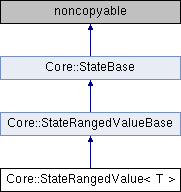 |
Seg3D
2.4
Seg3D is a free volume segmentation and processing tool developed by the NIH Center for Integrative Biomedical Computing at the University of Utah Scientific Computing and Imaging (SCI) Institute.
|
 |
Seg3D
2.4
Seg3D is a free volume segmentation and processing tool developed by the NIH Center for Integrative Biomedical Computing at the University of Utah Scientific Computing and Imaging (SCI) Institute.
|
#include <StateRangedValue.h>

Public Types | |
| typedef T | value_type |
| typedef boost::shared_ptr< StateRangedValue< T > > | handle_type |
| typedef boost::signals2::signal< void(T, Core::ActionSource) > | value_changed_signal_type |
| typedef boost::signals2::signal< void(T, T, Core::ActionSource) > | range_changed_signal_type |
| This signal is triggered when the range of the state is changed. | |
| typedef boost::signals2::signal< void(T, Core::ActionSource) > | step_changed_signal_type |
| This signal is triggered when the step of the state is changed. | |
 Public Types inherited from Core::StateBase Public Types inherited from Core::StateBase | |
| enum | { DO_NOT_LOAD_E = -1, LOAD_LAST_E = 0, DEFAULT_LOAD_E = 100 } |
| typedef boost::signals2::signal< void() > | state_changed_signal_type |
| This signal is triggered when the state is changed. | |
Public Member Functions | |
| StateRangedValue (const std::string &stateid, const T &default_value, const T &min_value, const T &max_value, const T &step_value) | |
| virtual std::string | export_to_string () const |
| Convert the contents of the State into a string. | |
| virtual bool | import_from_string (const std::string &str, Core::ActionSource source=Core::ActionSource::NONE_E) |
| Set the State from a string. | |
| void | set_range (T min_value, T max_value, Core::ActionSource source=Core::ActionSource::NONE_E) |
| void | set_step (T step_value, Core::ActionSource source=Core::ActionSource::NONE_E) |
| T | get () const |
| Get the value of the state variable. | |
| bool | set (T value, Core::ActionSource source=Core::ActionSource::NONE_E) |
| bool | offset (const T &offset_value, ActionSource source=ActionSource::NONE_E) |
| Offset the value of the state variable by the specified amount. | |
| void | get_range (T &min_value, T &max_value) |
| Get the range of the variable. | |
| void | get_step (T &step) |
 Public Member Functions inherited from Core::StateRangedValueBase Public Member Functions inherited from Core::StateRangedValueBase | |
| StateRangedValueBase (const std::string &stateid) | |
 Public Member Functions inherited from Core::StateBase Public Member Functions inherited from Core::StateBase | |
| StateBase (const std::string &stateid) | |
| void | set_is_project_data (bool is_project_data) |
| Set whether the data is part of the project data. | |
| void | set_locked (bool locked) |
| bool | get_locked () const |
| Query whether the variable has been designated as locked. | |
| int | get_session_priority () const |
| Get the priority in which loading sets the states. | |
| void | set_session_priority (int priority) |
| By default the priority is set to DEAFULT_LOAD_E. | |
| std::string | get_stateid () const |
| Get the unique id assigned to the state variable. | |
| bool | is_project_data () const |
| Whether the data is tagged as project data that is saved in a session. | |
Public Attributes | |
| value_changed_signal_type | value_changed_signal_ |
| range_changed_signal_type | range_changed_signal_ |
| step_changed_signal_type | step_changed_signal_ |
 Public Attributes inherited from Core::StateBase Public Attributes inherited from Core::StateBase | |
| state_changed_signal_type | state_changed_signal_ |
Protected Member Functions | |
| virtual void | export_to_variant (Variant &variant) const |
| Export the state data to a variant parameter. | |
| virtual bool | import_from_variant (Variant &variant, Core::ActionSource source=Core::ActionSource::NONE_E) |
| Import the state data from a variant parameter. | |
| virtual bool | import_offset_from_variant (Variant &variant, ActionSource source=ActionSource::NONE_E) |
| Import the offset value from the variant and apply it to the current value. | |
| virtual bool | import_range_from_variant (Variant &variant_min, Variant &variant_max, ActionSource source=ActionSource::NONE_E) |
| Import range values from variants. | |
| virtual bool | validate_variant (Variant &variant, std::string &error) |
| virtual bool | validate_value_type_variant (Variant &variant, std::string &error) |
| Returns true if the value stored in the variant is a valid offset value, otherwise false. | |
 Protected Member Functions inherited from Core::StateBase Protected Member Functions inherited from Core::StateBase | |
| void | enable_signals (bool signals_enabled) |
| bool | signals_enabled () |
| Check whether signals are enabled. | |
| void | set_initializing (bool initializing) |
| bool | get_initializing () const |
| Query whether the state variable and its parent are still being initialized. | |
| virtual void | invalidate () |
This class is a specification of State that is used to hold a single bound instance of a value.
| typedef boost::signals2::signal< void( T, Core::ActionSource ) > Core::StateRangedValue< T >::value_changed_signal_type |
Signal when the data in the state is changed, the second parameter indicates the source of the change
|
inline |
Set the value of the state variable NOTE: this function by passes the action mechanism and should only be used to enforce a constraint from another action. Normally use the action mechanism to ensure that the action is recorded correctly.
|
inline |
Set the range of permissible values for this state variable. This variable normally is represented by a slider and this one records the min and max values so values can be validated correctly
|
inlineprotectedvirtual |
Validate a variant parameter This function returns false if the parameter is invalid or cannot be converted and in that case error will describe the error.
Implements Core::StateBase.
 1.8.10
1.8.10